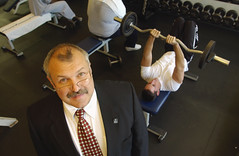The sports science world knows William Kraemer as an expert in the field of exercise science with special emphasis on the study of strength training. But the Neag professor sees himself simply as “the old coach,” giving credit to his colleagues for the many awards that have come his way over a long career in kinesiology.

Two honors added to Kraemer’s mantel in the past year are a ceremonial medallion from Finland’s University of Jyvaskyla and the UConn Alumni Award for Research Excellence in Science.
They are gratifying affirmations of his research, says Kraemer, but he adds, “I can’t stress enough that it takes a lot of people to do this work. Research is a collaborative effort of ideas and creativity, and I think people underestimate how truly difficult it is.”
His colleagues in the Department of Kinesiology’s Human Performance Laboratory include Carl Maresh, Jeff Volek, Craig Denegar and Larry Armstrong.
In studies that range from muscle damage in Division I college football players to cellular changes in muscle fibers during space travel, Kraemer has always been motivated by an idea that goes well beyond the scope of highly trained athletes: “How do we get stronger? How do we improve function and performance? Our work has been a quest to better understand the physiology and blend it with biochemistry, genetic mechanisms and nutrition in order to understand human performance.”
The result, he says, is that Kraemer and his colleagues at the Neag School’s Human Performance Lab have published more applied science and sports science research than any other lab in the country.
One of his collaborations, dating back nearly 20 years, eventually led to Kraemer’s being awarded the Finnish medallion. He first met friend and fellow scientist Dr. Keijo Hakkinen in 1992 when Kraemer was on faculty at Penn State University and Hakkinen spent his sabbatical at Penn’s Center for Sports Medicine. Seventeen years later, Kraemer spent his sabbatical working with Hakkinen in Finland, producing major research involving the physiology of aging and resistance training. That work precipitated the University Medallion, making Kraemer the first non-Finnish citizen to be awarded the University of Jyvaskyla’s highest honor.
Perhaps his most important collaboration involves Maresh, who, in the early 1970s, took on the then-20-year-old Kraemer as an undergraduate lab assistant at the University of Wisconsin-LaCrosse. They worked together again at UConn in 1987. Kraemer then moved on to posts at Penn State and Ball State before returning to the Neag School’s Kinesiology Department in 2001. Maresh nominated Kraemer for the Alumni Association award last year.
The year before he received two honors recognizing the breadth and depth of his research contributions to the fields of sports medicine and exercise science. He was bestowed with the University’s highest research award, the Provost Research Excellence Medal. The National Strength and Conditioning Association, the leading authority on strength and conditioning worldwide, attached Kraemer’s name to its most prestigious research award. The William J. Kraemer Outstanding Sport Scientist Award is presented each year during the association’s annual meeting held in July.
 Facebook
Facebook
 Twitter
Twitter
 LinkedIn
LinkedIn
